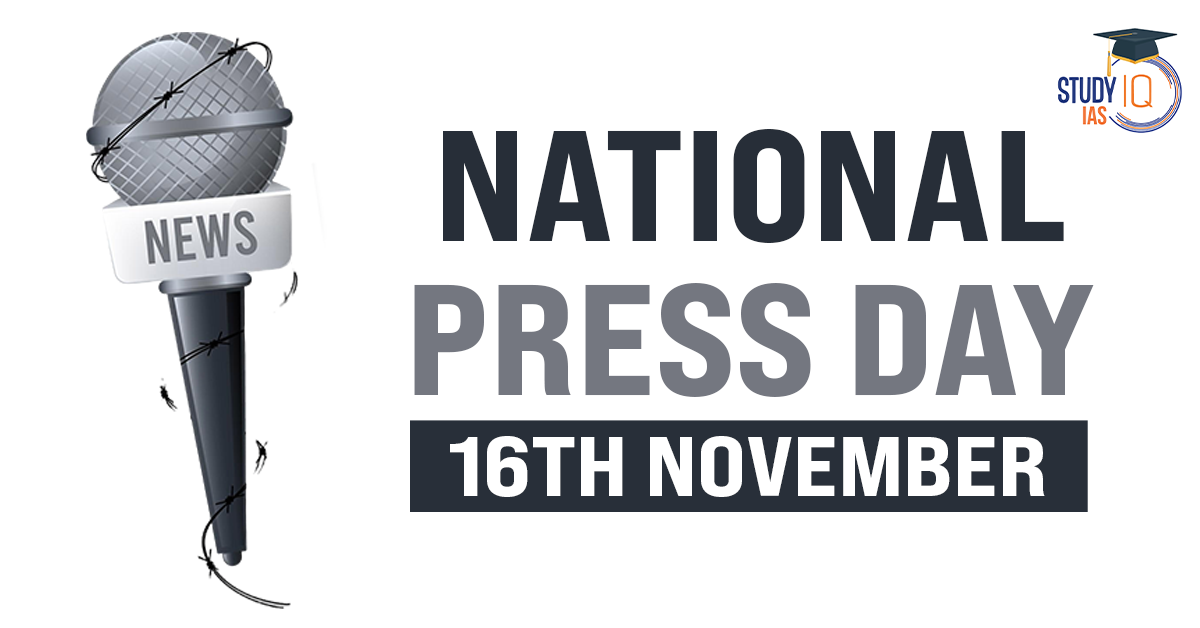Table of Contents
National Press Day, celebrated every year on November 16, marks a significant moment to reflect on the role of the media in India’s democracy. It serves as a reminder of the press’s responsibility to the public, its role in promoting transparency, and its duty to hold the government accountable. The observance of National Press Day 2024 provides an opportunity for the Indian press to deliberate on its role in society, the challenges it faces, and the future of journalism in the digital era. This article delves into the historical context, theme, significance, role, and challenges of the Indian press, making it essential reading for UPSC aspirants focusing on issues related to governance, media, and Indian polity.
National Press Day 2024
National Press Day is observed on November 16 each year, commemorating the establishment of the Press Council of India (PCI) in 1966. This day marks a celebration of press freedom and journalistic responsibility in India. On this day, the country acknowledges the media’s crucial role in maintaining the democratic framework, ensuring transparency, and providing citizens with factual, timely, and unbiased information.
| Aspect | Details |
|---|---|
| Date | November 16, 2024 |
| Established by | Press Council of India (PCI) in 1966 |
| Significance | Celebrates press freedom and accountability |
| 2024 Theme | “Changing Nature of the Press” |
| Objective | To emphasize the role of free and fair journalism |
Significance of National Press Day 2024
National Press Day celebrates the pivotal role the press plays in fostering democratic values, promoting transparency, and encouraging public accountability. The press is often called the “Fourth Pillar of Democracy” due to its essential role in upholding the Constitution and providing a platform for public discourse. The day emphasizes that a free press is vital for democracy, as it allows citizens to make informed decisions, understand government policies, and challenge wrongdoings. In 2024, National Press Day takes on additional importance with the growing influence of digital media and the challenges posed by misinformation, media ownership concentration, and threats to journalists.
History of the Indian Press
The history of the Indian press is deeply intertwined with the country’s fight for independence and freedom of expression. The press, over centuries, has played a significant role in shaping India’s political landscape.
- Early Beginnings:
- The first newspaper in India, Hicky’s Bengal Gazette, was launched in 1780 by James Augustus Hicky. It was a pioneering effort to counter British rule and provide a voice for Indian concerns.
- In 1826, Pandit Jugal Kishore Shukla started India’s first Hindi newspaper, Udant Martand, which contributed significantly to spreading literacy and national consciousness among Hindi-speaking masses.
- Press as a Weapon in the Freedom Struggle:
- During the Indian Freedom Movement, the press played an instrumental role in mobilizing the masses against British rule. Leaders like Mahatma Gandhi, Bal Gangadhar Tilak, and Subhas Chandra Bose utilized newspapers like Young India, Kesari, and The Hindu to promote nationalist sentiments, criticize British policies, and build a collective consciousness for independence.
- The Indian National Congress and other political groups also utilized newspapers to advance their agendas and spread revolutionary ideas.
- Post-Independence:
- After India gained independence in 1947, the press continued to evolve, focusing on nation-building, development, and governance issues. The Press Council of India (PCI) was established in 1966 to ensure ethical journalism and to safeguard the interests of the press.
Press Council of India (PCI) and its Role
The Press Council of India (PCI) was set up in 1966 with the primary objectives of safeguarding press freedom and improving the quality of press content in India. It is an autonomous, quasi-judicial body responsible for ensuring that the press adheres to high journalistic standards.
- Composition and Functioning:
- PCI comprises a Chairman, usually a former Supreme Court or High Court judge, and members representing journalists, media owners, and eminent people from the fields of law, literature, education, and public life.
- The Council is responsible for ensuring the integrity of the media by monitoring journalistic ethics, handling complaints of biased or unethical reporting, and promoting professional conduct.
- Challenges to Press Freedom:
- The Emergency period (1975-77) in India saw the suspension of the PCI, reflecting the challenges to press freedom during politically turbulent times. However, the re-establishment of PCI in 1979 reinforced the need for a free, fair, and independent press.
National Press Day 2024 Theme: “Changing Nature of the Press”
The theme for National Press Day 2024—”Changing Nature of the Press”—addresses the dynamic transformation of journalism, particularly in the digital age. This theme brings attention to the following:
- Digital Transformation:
- The internet and social media have revolutionized how information is disseminated. Digital media has given rise to new forms of journalism, with blogs, podcasts, and video journalism becoming popular.
- This transformation, however, has created challenges like the spread of fake news, misinformation, and media bias, which threaten the credibility of journalism.
- Audience Behavior:
- The nature of audiences has changed, with more people consuming news through mobile phones and social media platforms, often bypassing traditional media channels.
- This shift has altered the way journalists engage with their audience, raising concerns over audience fragmentation and the rise of echo chambers and filter bubbles.
- Journalistic Ethics:
- As the media landscape evolves, there is a growing need to discuss and uphold ethical journalism. The rise of citizen journalism and user-generated content has created new ethical dilemmas for media organizations and journalists.
Freedom of Press in India: Constitutional Framework
The Indian Constitution guarantees the Freedom of the Press as a fundamental right under Article 19(1)(a), which grants citizens the right to freedom of speech and expression. However, this freedom is subject to reasonable restrictions under Article 19(2), which includes considerations related to national security, public order, and decency.
Despite this constitutional protection, challenges such as media censorship, attacks on journalists, and commercialization of media continue to undermine press freedom. The media industry faces increasing political pressure, corporate ownership concentration, and intimidation of journalists, leading to concerns over the independence of the press.
Press and Registration of Periodicals Act, 2023
The Press and Registration of Periodicals Act, 2023 aims to modernize the registration process for print and digital publications in India. This act includes measures to enhance transparency and monitor media publications more effectively in an age of rapid technological advancements. It also mandates the disclosure of ownership and other details, which will help ensure that media organizations maintain credibility and transparency.
Challenges Facing the Press in India Today
Despite the progress, the Indian press continues to face several challenges:
- Concentration of Media Ownership:
- A small number of corporate groups control a large portion of the media, which raises concerns about the objectivity and diversity of news coverage.
- Censorship and Threats to Journalists:
- Journalists in India face increasing threats, harassment, and legal action, especially when reporting on sensitive topics such as corruption, human rights violations, and government policies.
- Misinformation and Fake News:
- The rise of social media and digital platforms has led to an increase in misleading information, fake news, and propaganda, challenging the credibility of the press.
- Economic Pressures:
- The economic model of many media outlets relies heavily on advertisement revenue, which can lead to compromise in editorial independence, as media houses may avoid publishing content that could alienate advertisers or powerful stakeholders.
Conclusion
The Indian press continues to evolve in the face of rapid technological advancements and changing societal expectations. While digital media has democratized access to information, it has also introduced challenges such as fake news and journalistic integrity. National Press Day 2024 serves as a reminder that a free and responsible press is crucial for the survival of India’s democratic framework.
For UPSC aspirants, understanding the evolving role of the press is vital, as it is closely linked to democratic governance, accountability, and constitutional rights. The press will continue to shape public opinion, influence policymaking, and hold authorities accountable in the years to come.


 5 Years of SVAMITVA Scheme and Its Benef...
5 Years of SVAMITVA Scheme and Its Benef...
 Places in News for UPSC 2025 for Prelims...
Places in News for UPSC 2025 for Prelims...
 Countercyclical Capital Buffer (CCyB): P...
Countercyclical Capital Buffer (CCyB): P...





















